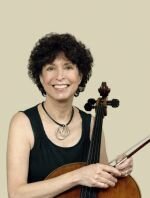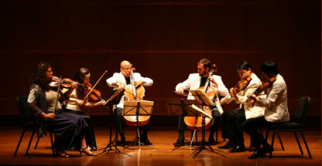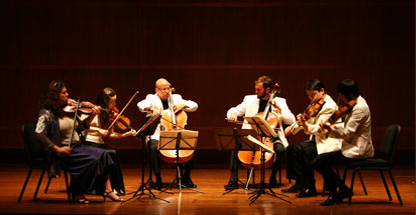
Toby Saks won’t be running it any more, but she isn’t going away. While she is handing over the artistic director reins of Seattle Chamber Music Society and its summer and winter festivals to violinist James Ehnes, she will still be a presence there, with advice as asked for, with her in-depth knowledge of the chamber music scene, and not least, with her house open to all the visiting musicians for rehearsing, eating and just hanging out.
Monday saw the opening performance of the 30th Summer Festival, in its second year at Nordstrom Recital Hall. There will be 17 series and two family concerts, four weeks in July at Nordstrom, and two weeks in August at The Overlake School in Redmond. For those who want to listen in a more casual atmosphere, the music will be piped free to the Garden of Remembrance outside Benaroya Hall and, on Friday July 8, 15, and 22, to Westlake Park as well, while at Overlake there is a lawn to picnic on while listening.
As well, the Society has always presented a free half-hour recital one hour before each concert.
Saks’ has chosen many of her favorite works for her final season, not all of them, she says, because there are far too many, but we can look forward to an eclectic variety of composers, mostly from the great heyday of chamber music, the classical and romantic eras.

Monday’s performances opened the festival on a high note. The recitalists choose their own programs, and pianist Orion Weiss performed three toccatas and an unexpected fourth, beginning with Bach’s Toccata in C Minor. From the first notes, one could sit back and bask in the sound, because it was clear that this was a consummate musician who could elucidate Bach’s mysteries. He brought each line of music as its musical prominence indicated, yet the whole had a coherent completeness and transparency.
Weiss described a toccata as being a work of fantasy, often seemingly improvisatory, often leading into a fugue, a description which fitted the Bach. He neglected to mention that a toccata is usually a virtuoso piece. The Bach certainly is, and even more so the works which followed: a minute-long Toccata by Liszt which had enough notes for a symphony, and the more substantial Toccata in C Major by Schumann. Each of these requires a superb technique to encompass the notes yet make that all in service to the music itself. Weiss achieved it with ease and insight, though I felt the Schumann could have been played a tad slower with a little more room to breathe.
He finished up with an impromptu encore, a Toccata by Keith Jarrett. One might think that Jarrett, 150 years or so younger than Liszt, and from a different musical stream, might not fit here, but this was an equally brilliant performance which followed seamlessly in the genre.
If this recital hadn’t been enough work for him for one night, with festival newcomer pianist Inon Barnatan, Weiss also played the closing work of the concert proper, Rachmaninoff’s Suite No. 2 in C Major for two pianos. Barnatan fits the mold of artists new to the festival. He’s young, 32 this year, received an Avery Fisher grant in 2009 and has been building an impressive name for himself as an artist.
Barnatan is a welcome addition. His and Weiss’s performance of the Rachmaninoff demanded attention. Exciting from the start, thunderous at times—imagine four hands using what sounded like all the fingers playing together and clamoring to be heard—as well as exquisite softness, lively and light with the two players apparently having a great time. More important, they played as though one. Two piano works can often sound clunky, but apart from one chord at the end of the first movement where they weren’t quite together, the two men were in the same intuitive groove which became tighter and tighter as the work progressed. Often two piano works are performed by siblings, or people who have known each other for decades. Barnatan and Weiss have only know each other for a few years, and played together sometimes, but one would never know it.
In between these bookends of Monday’s performances came Glazounov’s Quintet for Strings in A Major, with two cellos, and two trios for violin, cello and piano, one by Brahms in C Minor, and the other Three Nocturnes by Ernst Bloch. All were worth hearing, but the standout was the less familiar Bloch.
Written between the two world wars, Saks’ husband Martin Greene observed that it was composed by a Swiss Jew, and played here by a Russian Jew, pianist Anna Polonsky; a Dutchman, cellist Godfried Hoogeveen; and a German, violinist Augustin Hadelich.
The Nocturnes are gorgeous. Not flashy, but quiet, enigmatic; muted at first, expansive and joyful in the second one and with a hint of Ravel’s “Chansons Madecasses” in their mood, while the last sounded more like a fairly riotous nighttime party. The musicians balanced their performance so that the qualities of each instrument came through and the music sang.
Friday’s recital has Andres Diaz playing his 1698 Goffriller cello in Bach and composer Xi Wang, and concertgoers will hear Beethoven’s Piano Trio in E-Flat Major, and two piano quartets, by Suk and Dvorak.
Monday July 11 has Schumann, Mozart, Schubert, Debussy and a blockbuster quartet by Richard Strauss. All well worth hearing. For tickets: call 206-283-8808 or purchase online. For information email info@seattlechambermusic.org.
